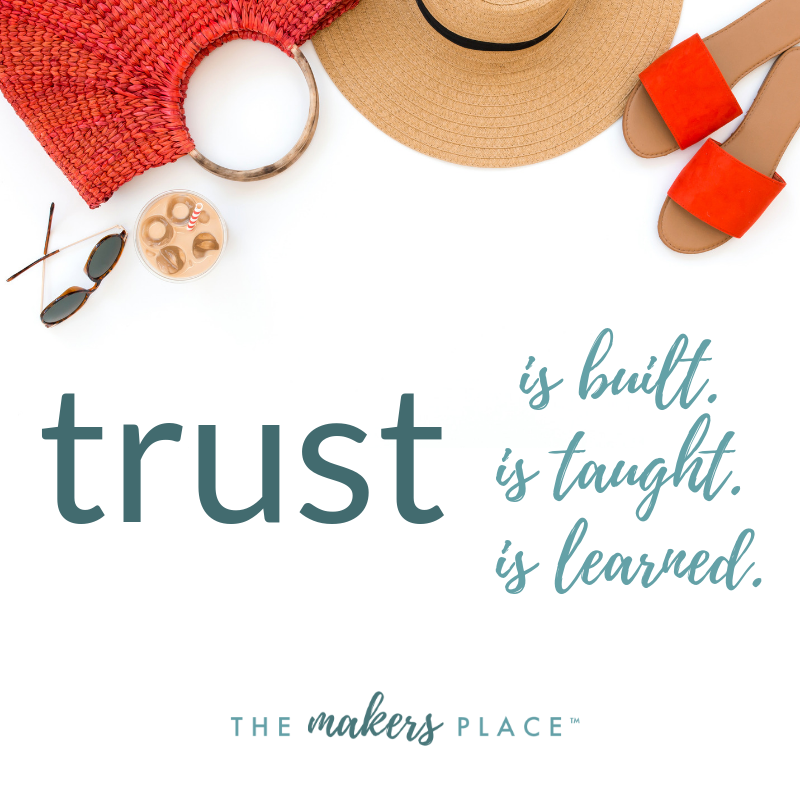“Do you trust me?” he said with an earnest voice as he looked deeply into her eyes.
Sitting in the dark theater among so many other families with their young kids, this question hung in the air between Aladdin and Jasmine in a scene most of us know too well. And while we may not be stepping on to a magic carpet, we have so many moments where we have to subconsciously respond to the same question.
On the surface, trust appears simple: You either trust someone or you don’t.
But what really makes trust work in our relationships?
And more fundamentally, how do we learn to truly trust ourselves?
As one of the most common words in the English language, trust is something we learn in utero. While a baby is growing safely inside the mother, they are cared for and protected. Once born, trust is now built daily through ordinary moments – being held, fed, changed, and cared for consistently so a child learns that their needs will be met. Developmental Psychologists call this process creating “secure attachment” which has profound positive benefits throughout one’s life, such as lower stress, better emotional regulation, and higher confidence and self-esteem, among others.
As adults, we still instinctively desire relationships where we can rely on each other and find safety and security. When dating couples were asked “what is the most important quality in a romantic relationship?” Social Psychologists found that trustworthiness was number one. More than physical attraction, more than money, more than everything else, trust is at the top.
We seek trust, but do we model it as well? To be able to fully trust another person, we first must become trustworthy. And through our actions and behaviors, we teach people what to expect of us and how they should treat us. In essence, trust is taught. Let’s examine three core qualities of trust and how we can teach them to our partners, friends, colleagues, and children.
The ABCs of Trust
Just like when we’re teaching young children how to read, it’s helpful to start with the basics: The ABCs. While trust can be operationalized in so many different ways, here are three core qualities that are foundational to trust-building and modeling trustworthiness.
Accountability: What can others expect you to do?
Our grandparents’ generation was famous for the age-old axiom “your word is your bond.” Simply put, what you say you’ll do, you do. Bottom line. But in a culture driven by FOMO and so many alluring options, we often forget how essential following through on our promises can be.
How consistent are you with your commitments? This starts with the basic behavior of doing what you say you’re going to do. From a parenting perspective, this looks like turning the television off five minutes after you give that “five-minute warning” or following through with an incentive you promised if your child has positive behavior. Others learn how consistent we are based on what we do, not just what we say. You must first hold yourself accountable, so you build trust in your family and relationships.
Boundaries: Where do you draw your lines?
Trust is broken when boundaries are crossed. But what happens if these boundaries are left unspoken or even unrealized? To cultivate trustworthiness in relationships, we need to create clear expectations for what we will and won’t do so others know how to support us with integrity. When boundaries are respected and upheld, trust is strengthened and affirmed.
This can be especially challenging if two people are operating from different values or priorities. One person wants structure, while the other craves flexibility and you appear at an impasse. Openness, empathy, and emotional attunement are fundamental to sharing why a certain boundary is important to us and listening with understanding to each other. Consider what your boundaries are and how you share them with the people in your life to cultivate more trust.
Character: Who can others expect you to be?
When we’re acting in congruence with our values, living within our boundaries, and showing up consistently with accountability, people begin to really KNOW us. This is the essence of developing our character: who we are at our core based on what we believe and model. Knowing someone’s character allows us to better love and support them because our emotional compass understands their “true north” – what is typical for them and what is not.
For example, if you best friend who is normally a very balanced and kind person has a bad day and starts ranting about what happened at work, that doesn’t make her a “gossip” (or worse!). Rather, it shows you that her behavior is out of character and she trusts YOU to provide support. In a society that is quick to judge and label, truly knowing someone’s character allows us recognize an out-of-sync behavior and check in with the person in a way that models trust.
Trust is built. Trust is taught. Trust is learned.
Start by examining your ABCs and realign with these fundamentals to strengthen trust in your relationships. Make commitments to yourself to trust what you know you need and share it with others you trust. Relationships are built and broken based on trust. Be a builder.




